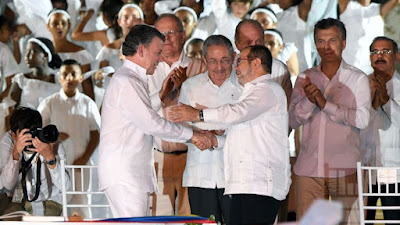Colombian President, Juan Manuel Santos on Monday, September 26, 2016 signed a historic peace agreement with Marxist rebel leader, Timochenko.
After 52 years of fighting left hundreds of thousands dead and millions homeless, four years of talks have ended with a peace deal.
The words of Rodrigo Londono, alias Timoleon “Timochenko” Jimenez, came after he signed a historic peace agreement with the government.
He said: “In the name of FARC, I sincerely apologise to all the victims of the conflict for any pain we may have caused during this war.”
The gathering of 2,500 international dignitaries, including UN Secretary General Ban Ki-moon and US Secretary of State John Kerry, responded with loud cheering, many wiping tears from their eyes.
Some called for Mr Londono and Colombian president Juan Manuel Santos to embrace but in the end the pair simply clasped hands.
More than 220,000 people were killed and eight million left homeless by the war, which has now been ended with a 297-page deal between Mr Londono on behalf of the Revolutionary Armed Forces of Colombia, and Mr Santos.
Mr Londono called Mr Santos a “courageous partner”, adding: “Let no one doubt that we are going into politics without weapons.
“We are going to comply (with the accord) and we hope that the government complies.”
As part of the deal, FARC is guaranteed at least 10 seats in congress over the next two legislative periods and they will turn their weapons over to the UN.
The European Union has said FARC will now be suspended from its list of terrorist organisations and, while the US has been more cautious, Mr Kerry said he was “ready to review and make judgments as the facts come in”.
The path of the deal in Colombia, however, is not yet over, with Colombians to have the final say with a vote on 2 October.
Polls say the deal will almost certainly be accepted but some add that expected poor turnout may not bode well for the task of implementing the terms.
One of the main challenges is a part of the deal that states rebels who lay down their weapons and confess to their crimes will be spared jail time.
They will also be allowed to work towards reparations for their victims through development work in areas badly-affected by the conflict.
But these parts of the deal have angered many victims.
